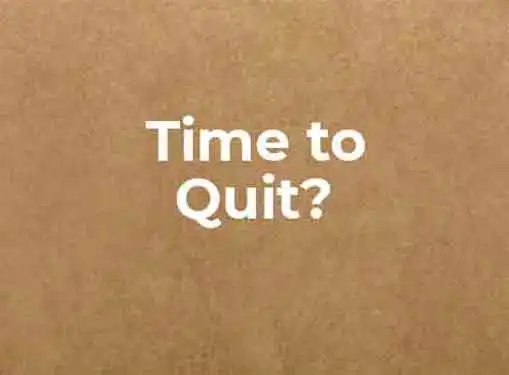Starting a Business
When to Quit the Day Job
When starting a business, it's wise to keep your day job. But eventually you get to the point when it's time to cut the cord. We discuss how you can know when it's time to quit the day job and focus on your business full-throttle.
One of the most perplexing dilemmas for a new business owner is knowing when the time is right to quit the day job.

For the business owner, the answer is as soon as possible. For their spouse, the answer is usually never. There must be a happy medium somewhere, right?
Well, the short answer to when should I quit my day job is not until you absolutely have to. Your day job guarantees you steady income, important benefits like health insurance, and something to fall back on should the business tank. Your new business, on the other hand, offers no guarantees and will most likely yield negative earnings for at least the first few years. But sooner or later, the demands of your company are going to surpass the number of hours in a day. When that happens, here are some the signs that might indicate it's time to turn in your notice and take the plunge.
Salary Reserve
Even thriving businesses experience downturns from time to time. It's not beyond the realm of possibility that your business could dry up the day after you leave your day job bobbing in your wake. If that happens, it's nice to know that you've saved up enough cash to cover your personal expenses for a period of at least six months (preferably a year).
Positive Business Equity
Another sign to look for is for the business to have a positive equity position. Remember: Every dollar you earn outside the business is a dollar that can stay in the business. Once you leave your day job, you will have to rely on the business for your livelihood. But while you are working your day job, the funds that would finance your livelihood can remain in the company and be converted to equity. That might not seem important now, but later on - like when you seek financing for an expansion - it could be a very big deal.
Earnings Track Record
Should you quit your day job the first month your business experiences positive earnings? Probably not. An earning upturn can just as quickly become an earnings downturn, leaving you hanging out to dry. It's a better idea to wait until your business has developed a track record of positive earnings - several quarters of sustained, positive net income - before making the decision to become a full-time small business owner.
Fringe Benefits
If your business can't afford to pay your salary, the decision to continue working your day job is a no-brainer. But if your business can't afford to pay for things like health insurance, life insurance, retirement, and other benefits, you should be just as motivated to keep your day job. Like it or not, people rely on fringe benefits to provide a reasonable level of personal security, and the lack of these perks could leave you and your family exposed and vulnerable. In the worst case scenario, your dream of business ownership could rapidly become a nightmare of epic proportions.
Share this article
Additional Resources for Entrepreneurs



Conversation Board
We greatly appreciate any advice you can provide on this topic. Please contribute your insights on this topic so others can benefit.